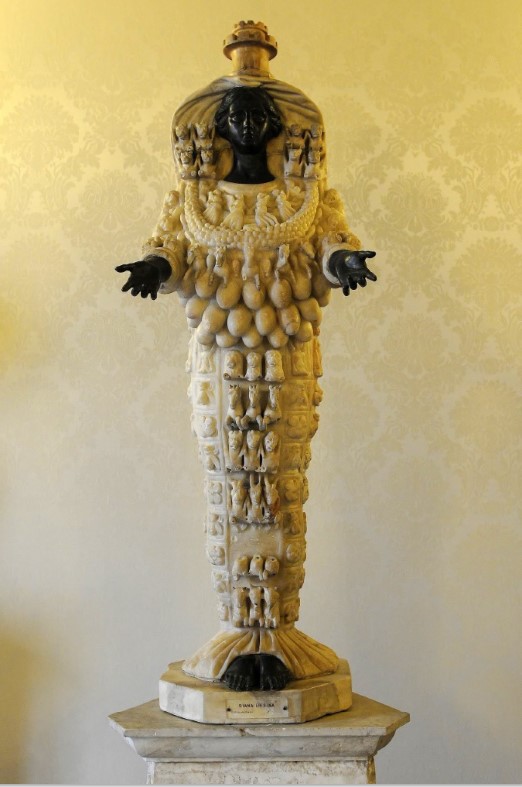A VIDEO CLIP went viral on social media, apparently showing disillusioned Hindus throwing their gods away. It was claimed that this was because they had been praying to the gods to save them from COVID 19, and it had not worked. This claim has since been refuted, but the story raises interesting issues.
A Powerless Goddess
In the 1st Century ad, the city of Ephesus in Asia Minor had a temple dedicated to the Roman goddess Diana. A lot of the city’s prosperity came from making religious artefacts for the worship of Diana, who was also known by the Greek name Artemis. Acts 19 relates how the Apostle Paul persuaded many citizens that there was only one God, the God of Christianity. These converts, both Greek and Roman, realised that Diana was just an idol and burned their religious books in public.
This caused a riot led by Demetrius the silversmith, who made silver shrines of Diana for a living. The people of Ephesus were not just disillusioned with their old faith: they had found a far superior and persuasive faith. This faith was based on Paul’s clear message about the reality of the coming Kingdom of God (Acts 19:8).
People change their religion. The Ephesian Christians changed their faith from a Roman goddess to the God of the Bible, because of a rational conviction. But is it reasonable to lose faith in a god who fails to grant requests—for example, to save people from COVID 19? The simple answer is a clear ‘no’. There is all the difference between being unable to save (like Diana of the Ephesians) and being able but not always willing to save (like the God of the Bible).
God Can Save
There are many examples in the Bible. Before the worldwide flood, Noah preached to the people, warning them of God’s imminent judgement. They did not respond, so they were destroyed in the flood. But Noah, who did believe, was saved by God (Genesis 6).
[God] did not spare the ancient world, but preserved Noah, a herald of righteousness, with seven others, when he brought a flood upon the world of the ungodly (2 Peter 2:5).
So God can and does save people from certain disasters. In contrast, in the New Testament several Christians were martyred for their faith. A notable example is Stephen (Acts 7). God did not save him from the wrath of the Jews, even though his only crime was to preach the Gospel. In fact, Jesus had told his followers that this sort of thing would happen: ‘You will be delivered up even by parents and brothers and relatives and friends, and some of you they will put to death’ (Luke 21:16).
The correct attitude was shown hundreds of years earlier by Daniel’s three friends in Babylon. They had refused to bow down to an image made by the king. As punishment they were told that they would be thrown into a furnace. The king said, ‘Who is the god who will deliver you out of my hands?’ (Daniel 3:15). And their response was: ‘Our God whom we serve is able to deliver us from the burning fiery furnace, and he will deliver us out of your hand, O king. But if not, be it known to you, O king, that we will not serve your gods or worship the golden image that you have set up’ (vs. 17–18).
So these men acknowledged that God had the power to save them, but that it was up to Him whether or not He did. They would still obey Him.
True Salvation
God is all powerful and has ultimate authority. We can have complete trust in Him, but that trust needs to acknowledge that He will do what is right. If our faith depends on Him doing what we want, then we have in effect invented a god.
God does promise to save, and to protect. Jesus told his disciples that every hair of their head was numbered (Matthew 10:30), and on another occasion that ‘not a hair of your head will perish’ (Luke 21:18).
But this promise is in the same passage as the warning that some of them would be killed (v. 16). How can this be?
We need to remember that God is primarily concerned with eternal things. Everlasting life, not just this life. Jesus’ true followers might be killed and so lose everything in this life. But ultimately not one small part of them will be lost: nothing permanently destroyed. God offers ultimate, everlasting salvation.
So we cannot assume that God will protect us in this life. Indeed, He uses some of the disasters which come upon us to further His plan and purpose. Trusting in His authority and purpose, we need to try to focus on the eternal, to ‘seek first the kingdom of God and his righteousness’ (Matthew 6:33) and to obey Him now. There is clear evidence in the Bible of His power to save. He can spare us in this life, but ultimately He wants to give us everlasting life (John 3:16). This is the salvation He offers: this is how He saves.
Anna Hart



